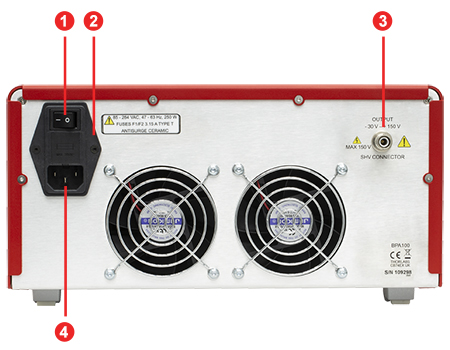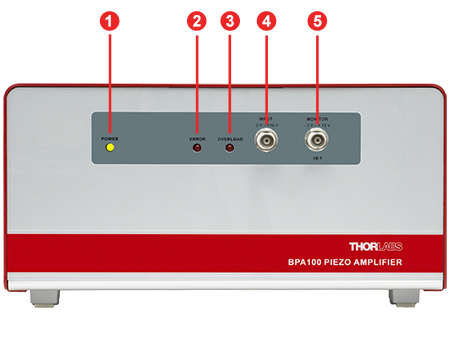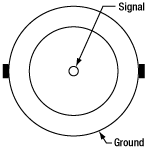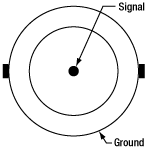High-Voltage Piezo Amplifier

- Ideal for Capacitive Loads of 1 µF to 10 µF
- High Output Voltages from -30 V to 150 V
- High Peak Currents up to 10 A
- For Use with Thorlabs Piezoelectric Devices
BPA100
High-Voltage Piezo Amplifier
CA3262
SHV Male to SHV Male Cable
(Not Included)

Please Wait

Click to Enlarge
Click for Raw Data
Measured typical load response for the BPA100 Piezo Amplifier. Data was measured using a sinusoidal waveform.
Note: The BPA100 amplifier is recommended for Thorlabs' piezoelectric devices that have an operating voltage range of 0 V to 150 V or -30 V to 150 V. If using a piezo rated for a smaller voltage range than that of the amplifier (-30 V to 150 V), extreme care must be taken when adjusting the external source to ensure that the voltage does not exceed the piezo's rated values. Exceeding these will damage the piezo.
Features
- Output Voltage Range: -30 V to 150 V
- Female SHV Connector
- SHV Cable (60") Available Separately
- Fixed 15X Voltage Gain
- 10 A Peak Current, 2.5 A Continuous Current
- Single-Channel Input (BNC): -2 V to 10 V
- Monitor Output (BNC): -3 V to 15 V
- Temperature Sensor for Overheat Protection
- Voltage Overload Protection
- Compatible with Thorlabs' Piezo Actuators and Adjusters with 150 V Maximum Drive Voltage
Our BPA100 High-Voltage Piezo Amplifier is a benchtop, open-loop amplifier suitable for use with many of Thorlabs' piezoelectric actuators, chips, and stacks. With a voltage gain of 15, this amplifier produces a maximum output voltage of +150 V, a continuous output current of 2.5 A (10 A peak), and low noise. The BPA100 amplifier is ideal for dynamic applications that require high, pulsed currents to rapidly charge and discharge high capacitance loads, such as liquid dispensing and vibration damping. See the graph to the right for details on the load response of this amplifier.
The low voltage input, a female BNC connector, is located on the front panel. This accepts -2 V to 10 V signal waveforms from external signal generators, computer controllers, or feedback networks. A second female BNC connector is provided for monitoring the output voltage and waveform. The monitor has a scaling of 10:1, so an output voltage of 150 V results in a 15 V monitor voltage.
To prevent internal damage during operation, the BPA100 amplifier features protection circuits that activate in the case of voltage overload or device overheating. These errors result in the illumination of the red ERROR and OVERLOAD LEDs on the front panel, respectively. Please see the manual for more information regarding these error conditions.
Connecting a Piezoelectric Device
The amplified voltage is output through a female safe high voltage (SHV) fitting on the rear panel for additional safety. In comparison to BNC connectors, SHV connectors include additional insulation and a recessed conducting pin to prevent accidental contact when unmated. They also feature a reversed gender interface to prevent mating with low voltage connectors; see the Pin Diagrams tab for details.
We recommend using the CA3262 SHV male to SHV male cable to connect the BPA100 amplifier to a piezo. This cable is not included with the unit and must be purchased separately. An SHV female to BNC male electrical adapter is available to support piezos with BNC connectors. Alternatively, we also offer an SHV female interface, which can be used to make an SHV output connection directly to the piezo. Please note that we do not advise using SHV to BNC electrical adapters on the rear panel of the BPA100 amplifier unit.
| Specifications | |
|---|---|
| Piezoelectric Output | |
| Voltage Output Range | -30 V to 150 V DC |
| Voltage Gain | 15 |
| Output Current | 2.5 A Continuous (AC RMS), 10 A Peak |
| Voltage Stability | 100 ppm Over 24 hours (After 30 minutes Warm-Up Time) |
| Noise | <0.5 mV RMS (Bandwidth 20 Hz to 100 kHz) |
| Typical Piezo Capacitance | 1 to 10 µFa |
| Input | |
| Input Type | Single Ended |
| Input Impedance | 10 kΩ |
| Input Voltage Range | -2 V to 10 V DC |
| Input Voltage for Full Range | 10 V DC ±2% |
| Monitor Output (BNC) | |
| Output Voltage Range | -3 V to 15 V |
| Output Impedance | 220 Ω |
| Minimum Recommended Load Impedance | 10 kΩ |
| Short Circuit/Overload Protection | Yes |
| Temperature Sensor | Yes |
| Scaling Factor (HV Monitor) | 1/10 (15 V for a Max Piezo Voltage of 150 V) |
| Input Power Requirements (IEC Connector) | |
| Voltage | 85 - 264 VAC |
| Supply Current | <2 A (Ignoring Power on Transient) |
| Protection | Internal Fuse, Qty. 2, T3. 15 A H 250 V Anti-Surge Ceramic |
| General | |
| Dimensions | 300.0 mm x 305.0 mm x 154.9 mm (11.81" x 12.01" x 6.10") |
| Weight | 6.0 kg (12.12 lbs) |
| Operating Temperature Range | 5 °C to 40 °C |

Click to Enlarge
Back Panel

Click to Enlarge
Front Panel
| Back Panel | |
|---|---|
| Callout | Description |
| 1 | AC Power Switch |
| 2 | Fuse Tray |
| 3 | SHV Female Connector (-30 V to 150 V Output) |
| 4 | AC Power Cord Connector |
| Front Panel | |
|---|---|
| Callout | Description |
| 1 | On/Off Green LED Indicator |
| 2 | Red LED, Error Indicator |
| 3 | Red LED, Overload Indicator |
| 4 | BNC Female Connector for Input Source, -2 V to 10 V |
| 5 | BNC Female Connector for Signal Monitoring, -3 V to 15 V |
Input
BNC Female

Input Voltage: -2 V to 10 V
Monitor
BNC Female

Output Voltage: -3 V to 15 V
Scaling: 10:1
Output
SHV Female

Output Voltage: -30 V to 150 V
SHV connectors have reversed gender to BNC. An SHV female connector has the contact pin, which is indicated by the filled in black circle.
| Posted Comments: | |
Likun Wang
(posted 2023-10-10 13:32:02.697) Hi, what is the slew rate of this amplifier? do'neill
(posted 2023-10-30 10:17:57.0) Response from Daniel at Thorlabs. We do not have a slew rate for these amplifiers as it is dependent on the capacitive load you use. It is possible to calculate the slew rate for a given load as the maximum current of the BPA100 divided by the capacitance. I will reach out to you directly to discuss your application. changshun xu
(posted 2023-01-06 02:49:04.107) 这台设备能不能控制压电梁,这能产生一定频率的电压脉冲信号吗 DJayasuriya
(posted 2023-01-20 08:48:12.0) Thank you for your inquiry. The amplifier is capable of high peak current pulses, in return the high output voltage, can result in very high peak pulse power that can damage your piezo. We will get in touch with you directly to discuss you application. |
 Products Home
Products Home












 High-Voltage Piezo Amplifier
High-Voltage Piezo Amplifier